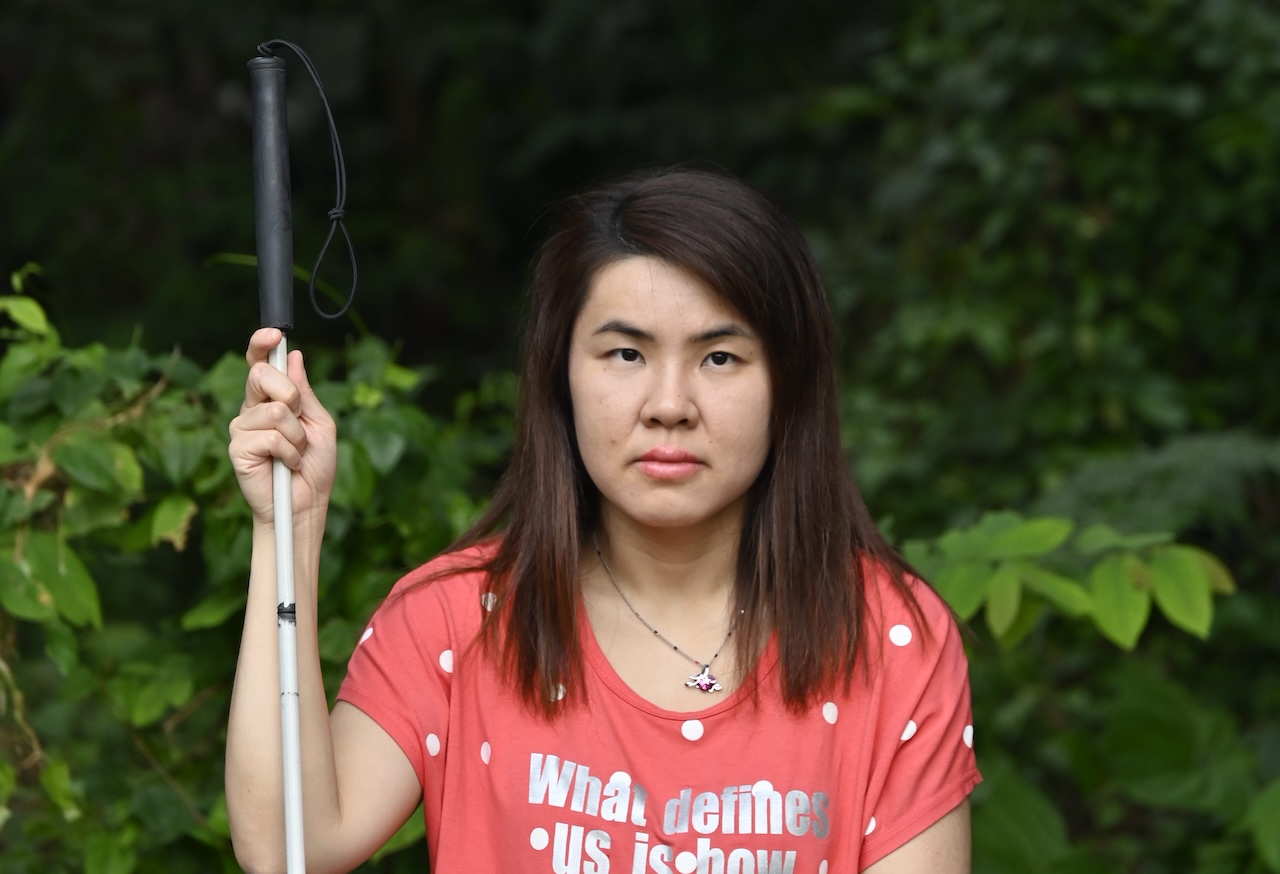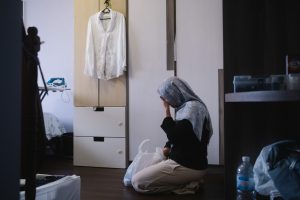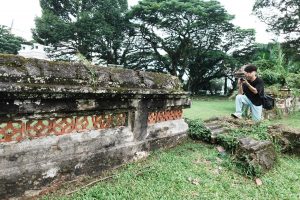Top image: Wai Seong
A man in a wheelchair is staring at a scenery of trees and distant buildings from a window. He’s expressionless. There’s a little twinge of sadness.
A female caregiver comes into the room with a big smile and cheerfully talks to him, hoping to lift his spirits.
ADVERTISEMENT
“My mother says you’re chatty. Can we strike a deal whereby you are very unchatty around me?” he responds dourly.
She leaves the room a short while after; her smile fading away.
How do these scenes Me Before You make you feel? And how do you suppose such scenes would make people with disabilities (PWDs) feel?
“Sometimes, we see disabled characters as hapless and helpless. That’s wrong! PWDs have their own lives and can be as happy as able-bodied people,” says Zareena Nazimuddin (“Reena”), who has dyslexia.
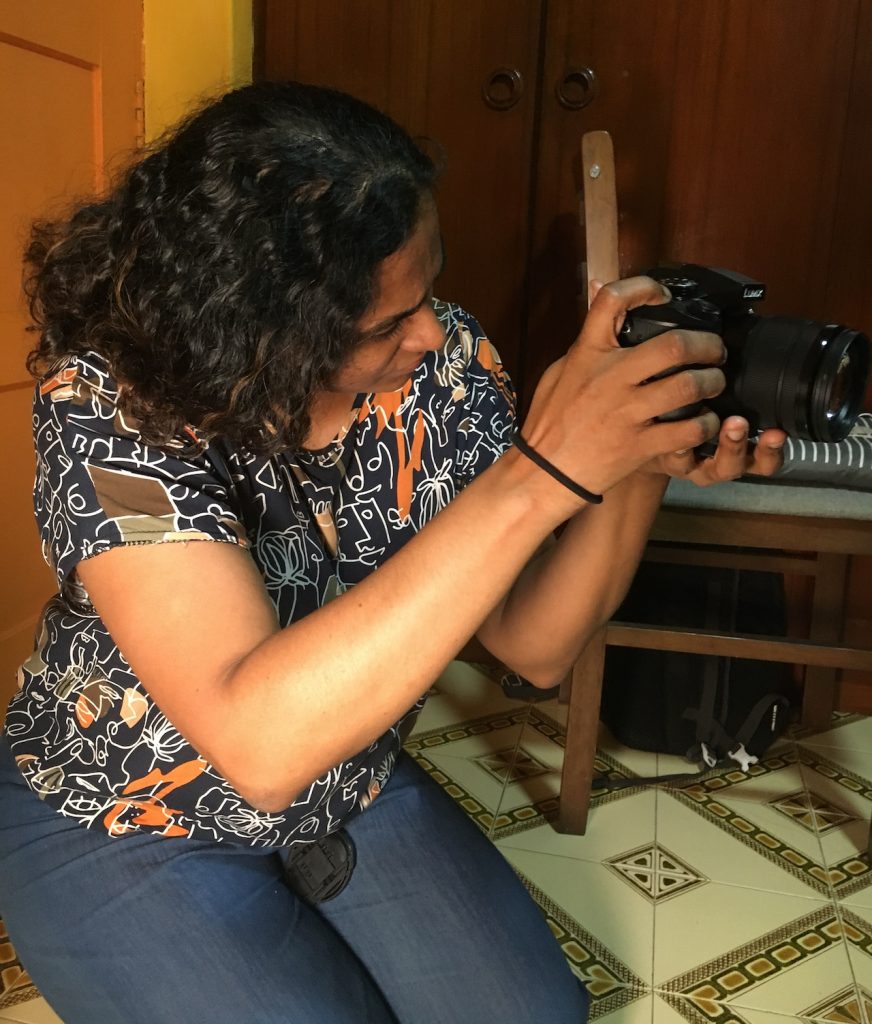
But the number of PWD actors and actresses in Singapore is so few, we could even count on one hand.
There’s deaf-blind teacher Theresa Chan, who starred as herself in Eric Khoo’s drama film Be With Me. There’s also Timothy Lee, an actor with Down syndrome who played a lead character in Mediacorp drama Kin.
“PWDs barely even have representation in the media,” remarks Jade Ow, an aspiring 22-year-old actress with moderate to severe hearing loss.
As someone hard of hearing, Jade opts not to use any hearing devices since she still retains some natural hearing. However, she relies on lipreading for communication, which presents challenges during certain staging and blocking scenarios. She finds it particularly difficult when performing in darkness or with her back turned to other performers.
Reflecting on her struggles caused by her condition, Jade shares: “After so many rejections in audition roles, I wanted to give up on my dream to become an actress.”
Otherwise, true representation is few and far between here, aside from abled actors portraying characters with disabilities, like Richie Koh, who played an intellectually disabled man in Mediacorp’s Channel 8 Mandarin drama series Your World in Mine. Or Andrew Marko, who won accolades for playing a teenager with severe autism in Pangdemonium’s production of Falling.
“The bigger problem stems from the idea that PWDs [can only] play disabled characters in stories specifically about disability,” Jade says.
She surmises that “maybe it’s because directors feel the need to justify and defend a disabled actor’s presence on stage”.
The Damned Ones
Reena is on a quest to change that narrative. As a 41-year-old teacher-turned-filmmaker, she decided to make a film aimed at normalising disability within Singapore’s acting industry and society at large.
Diagnosed with dyslexia, Reena struggles with paperwork, spreadsheets, and directions, yet rises above her challenges to be a teacher, scriptwriter, and film director.
“The greatest hurdle for actors and actresses with disabilities is not their disabilities, but our society’s stubborn refusal to see them beyond it,” affirms Reena.
ADVERTISEMENT
It led her to direct The Damned Ones in 2023, a film with PWDs portraying disabled characters. But it’s not a film centred around their disabilities — The Damned Ones is, instead, a supernatural mystery and horror flick.
“I decided to give any PWD struggling to break into the film industry an opportunity. I wanted to tell a story with disabled leads that did not revolve around disability,” she says.
Starring a fully disabled cast, The Damned Ones stars:
– Jade, an actress with moderate to severe hearing impairment.
– Amanda Yip, who has been diagnosed with retinitis pigmentosa. It causes progressive vision loss by affecting the retina, which senses light at the back of the eye.
– Michael Parks, who has undiagnosed reading and memory challenges.
In the film, Siti (played by Amanda), a university student accused of plagiarism, has disappeared. Her classmate Laura (played by Jade) is the prime suspect in Siti’s disappearance. But with a supernatural entity at play that haunts the guilty with crazy illusions, will Laura and the other characters find Siti in time?
While it’s important to acknowledge the disability as part of the actor’s identity, Reena explains that her film avoids downplaying or focusing solely on their disabilities.
“To me, featuring actors and actresses with disabilities to add to a cinematic experience felt ableist—as though PWDs only exist to cater to able-bodied people’s experiences,” she adds.
Faces in the Shadows
Failure is etched deeply in Jade’s memory as she pursued acting roles. Out of 60 auditions, she faced rejection 59 times.
Currently studying Theatre and Performance Studies at the National University of Singapore, Jade has a long history in performing arts and has dreamed of being an actress since she was young.

In 2021, Jade auditioned for 60 roles with Mediacorp’s Channel 5, advertisements, independent films, as well as theatre productions.
“Many auditions don’t give me reasons why I was rejected, but a lot of times, it’s about my pronunciation,” she remembers. She adds that her hearing condition affects the way she speaks and pronounces some words.
“I met directors who didn’t understand that I struggle to communicate with other actors if I can’t read their lips and facial expressions. So they often walk away disappointed.”
In 2022, she reached her lowest point during a gig as a lighting operator in a local stage production. A senior gave her the job as he needed an emergency replacement. Wanting to gain theatre experience, she accepted the assignment.
“It was my first time working in a theatre,” she said. “That’s my passion.”
However, she quickly faced potential issues. For instance, she couldn’t lip-read the manager, who would instruct her to manage the stage lights while standing behind her.
Fearful of the theatrical company’s reactions, Jade told them that she needed visual or tactical cues, such as a pen tap on her shoulder, but did not directly reveal her disability.
“I did not explicitly tell them that I was hard of hearing. It was a very short engagement of about six days, and at that time, I did not feel safe revealing what I considered a vulnerable part of myself to a stranger,” said Jade.
On performance day, her manager did not give her any cues, and Jade found herself unable to manage the stage lights. The theatrical production company let her go because they deemed her “incompetent”.
Jade plummeted into hopelessness, nearly surrendering her dream of becoming an actress.
Yet, “pure masochism and determination” powered through her veins. Persevering through 59 rejections, she finally passed her 60th audition to perform in a student-directed film.
Another glimmer of hope arrived when Jade and Amanda auditioned and enrolled in BEYOND DIS:PLAY, a professional theatre training programme for disabled actors at ART:DIS in 2023. The program was led by Peter Sau, the Head of Performing Arts and Artistic Development at ART:DIS.

ART:DIS provides learning and training opportunities for PWDs in the arts. It organised a taster workshop in March 2023, where Jade and Amanda met and became friends.
Not long after, Reena put up a cast and crew notice for The Damned Ones. Jade signed up to play the lead and brought in Amanda to play the second lead.
While The Damned Ones is Amanda’s first acting stint, she already has her standards.
“If I were cast to play a blind character who just sits in a corner and doesn’t talk, I’d feel discriminated against. Anyone can do that; why would they need a blind person to do that role?” Amanda asks.
“Being disabled doesn’t mean we can only act as decorative props in shows.”
Meanwhile, Michael was cast as an extra in several Mediacorp shows, including Sunny Side Up on Channel 5, Moments on Channel 8, and Chiron on Suria.
But Michael isn’t satisfied.
“I really want to be in a speaking role because I want to push myself as an actor,” he sighs.
“It’s a pity that Michael has only acted as calafare in mainstream media because he’s talented in acting,” Reena says in response.
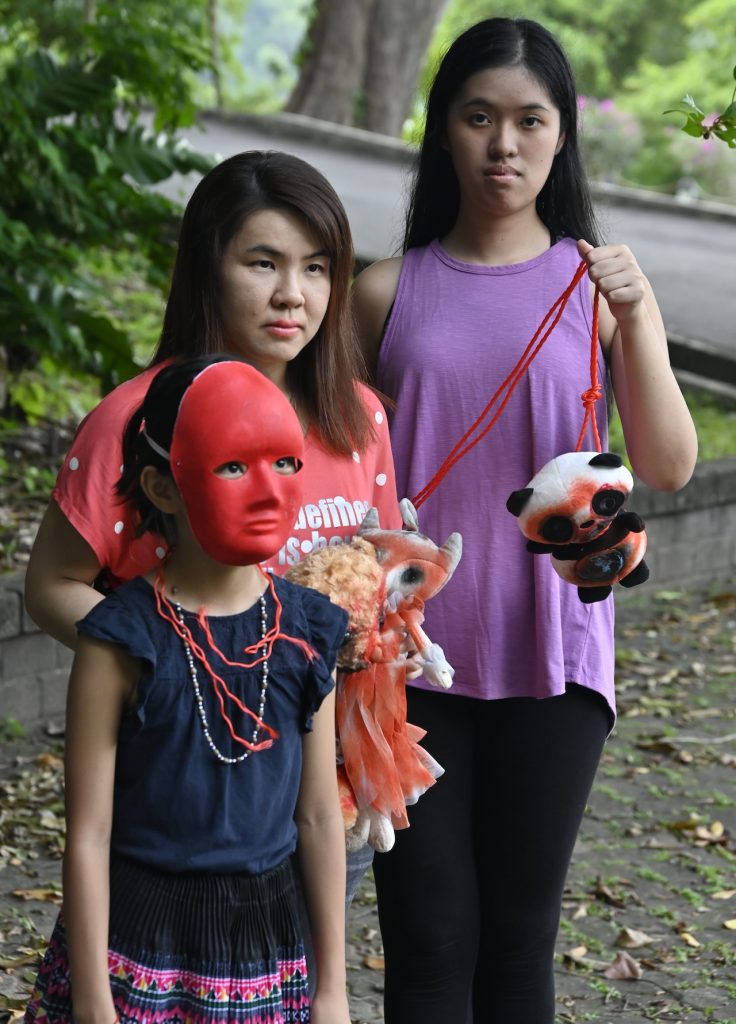
However, the issue goes beyond what we see as insufficient job opportunities for aspiring PWD actors. Peter believes that it starts with education.
“There’s a lack of training for them,” said Peter. “And this is partly because performing arts schools and academies aren’t fully accessible to them.”
For instance, he mentions that there are still no creative enabler providers, sighted guides, or sign language interpreters to serve disabled students.
Lights, Camera, Access
With Amanda and Michael having difficulties reading scripts, Reena allowed her cast to improvise most of their lines in The Damned Ones.
“Improvisation is easier and more natural for them,” she said. “Or else, more shoot days and expenses would have been needed. And my film already had a low budget of S$7,000.”
Shooting outdoor scenes was easier than expected. Reena’s concerns about the safety of her cast and crew also proved unfounded.
For instance, she postponed outdoor shoots if the weather got too hot. “I was worried for the health of my cast and crew,” she says, “although we had to contend with bouts of rain.”
Unable to see clearly what might hurt her in outdoor shoots, Amanda became worried for her own safety.
“I was scared of anything that I couldn’t see but could hear, including snakes, insects, and spiders,” she said.
Thankfully, Amanda didn’t sustain any injuries—the crew continually kept a lookout for insects and tree branches.

Proper representation was also an essential part of the plot. Before Jade joined Reena’s cast, Laura was an able-bodied character in Reena’s script.
When Jade took on the role of Laura, the script was altered to explicitly convey that Laura is hard of hearing but does not use hearing aids.
One part of the script was changed to Siti’s boyfriend (played by Michael) asking Laura why she refuses to don hearing aids.
“They hurt my ears,” Laura answered.
Reflecting on her character, Jade notes: “We want to show audiences that just because a disability seems invisible, it doesn’t make the disability disappear.”
The Money Maze
Before the filming of The Damned Ones began, Reena tried to get initial funding, including sponsorships for filming venues.
But she faced rejections.
“They labelled our disabled cast as a ‘risk management issue’,” she recalled.
Moreover, she found that her dyslexia made it difficult for her to read text-heavy grant documents.
“I was tired of facing constant rejections and decided to use part of my savings to make the film,” said Reena.
It’s just a tenth of a conventional budget for a horror film like The Damned Ones of at least S$70,000, which includes the wages of all the crew and cast, filming, and post-production editing costs.
In late 2023, Reena made a mini-docudrama to explain the filming process. The docudrama won third place at the annual Pokka Film Festival, a platform for emerging filmmakers to showcase their work to Singapore.
It also received an award from Member of Parliament Louis Ng in November 2023 and a feature in Tamil Murasu’s Tabla.
Now, Reena and her team are looking for sponsorships to apply professional audio and colour grading to the film so that it can compete in the upcoming 2024 Singapore International Festival of Arts from May 17 to June 2 and other regional film festivals.
These finishing touches, however, don’t come cheap at S$28,000, of which Pokka has already covered S$5,000. The film still needs S$23,000.
“The only way I can do justice to my cast and crew is to take this film to these festivals and recognise their talent,” said Reena.
Treat PWDs as people
The Damned Ones is just Reena’s first step to normalising disability in society through films to reduce prejudices and bias against PWDs. But it seems that not everyone agrees with how she’s going about doing it.
Another organisation rejected her grant application for her film simply because it did not focus enough on their disabilities and public interactions with the disabled.
“How can the public be inclusive if these organisations typecast PWDs to only act in ‘disability films’?” she asks.
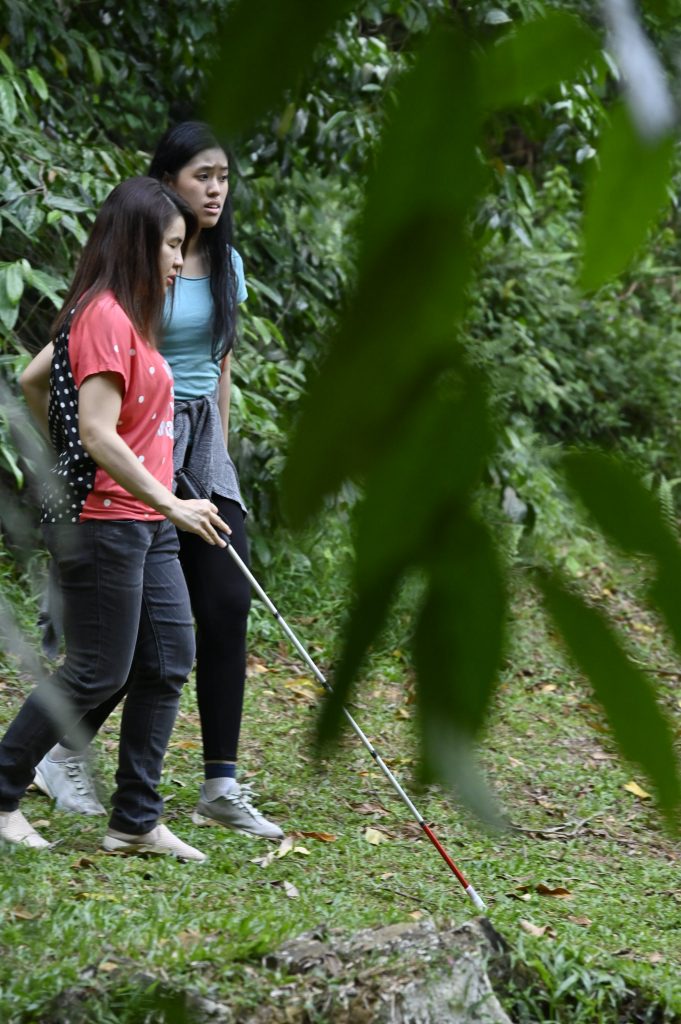

Peter offers that disability is a human condition, and we need to respect that. He added that anyone can face disabilities at some point in life.
“Do we want the truth on how we’ll experience life in the future? Or do we want to see someone who pretends to know what we’ll go through?”
Showbiz is a harsh industry. Its relentless demands for long hours and pressure to expedite filming processes might necessitate a different model that is more inclusive for PWDs.
“Working with people with disabilities isn’t about speeding up. It’s about the resources, preparation time, and downtime needed,” Peter explains.
Changes in infrastructure, working approach, and attitudes will go a long way toward improving accessibility for disabled people.
Some changes could be as simple as providing ramps and accessibility tools like screen readers, as well as allowing creative enablers or acting mentors to be on set.
“For autistic actors, the team has to be mindful of their anxiety triggers. Some actors with physical disabilities might need a space to recalibrate or a mattress to lie down,” he says.
While these changes may mean more expenses, he justifies them as contingency sums.
“We don’t want just any disabled person on stage. We want trained and quality actors-performers with disabilities who can stand the critical eye of the industry to represent their community. Or else we’ll do more harm in the long run.”
As for able-bodied actors playing disabled characters, Jade says it’s important for the disabilities to be portrayed as truthfully as possible.
“Creative teams should do more research on the complexities of the particular disability and talk to people with that condition,” she asserts.
As a fellow PWD, I know that we have untold stories and nuances that are yet unseen on screen and stage.
More of us need to be seen. More of us need to be heard. And more of us need to be out there.
Beyond Singapore’s shores, more directors are casting actors with disabilities in films. In the United States, Zack Gottsagen, who has Down syndrome, starred in The Peanut Butter Falcon. Recently, there’s a casting call in Canada for a teenage girl who uses a wheelchair to move around to take on a leading role in an upcoming show titled Taylor.
And more able-bodied actors are doing their due research on disabilities. We’ve got Emilia Jones playing a child of deaf adults in CODA and Riz Ahmed playing a drummer who loses his hearing in Sound of Metal. Both actors took the time to learn American Sign Language. Both films ensured inclusive casting and a commitment to accurate representations of PWDs. Both films won international acclaim and awards.
All this goes to show just what the local film, TV and theatre industry might be missing out on without giving PWDs their time to shine on screen.
“The things I can do as an actress are cool as long as I’m given the proper accommodations,” says Jade.
“Treat PWDs as people.”

